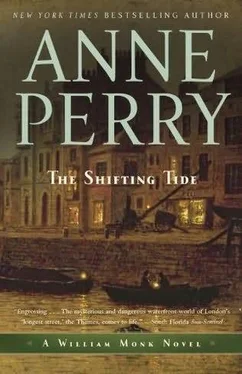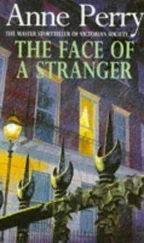Anne Perry - The Shifting Tide
Здесь есть возможность читать онлайн «Anne Perry - The Shifting Tide» весь текст электронной книги совершенно бесплатно (целиком полную версию без сокращений). В некоторых случаях можно слушать аудио, скачать через торрент в формате fb2 и присутствует краткое содержание. Жанр: Исторический детектив, на английском языке. Описание произведения, (предисловие) а так же отзывы посетителей доступны на портале библиотеки ЛибКат.
- Название:The Shifting Tide
- Автор:
- Жанр:
- Год:неизвестен
- ISBN:нет данных
- Рейтинг книги:5 / 5. Голосов: 1
-
Избранное:Добавить в избранное
- Отзывы:
-
Ваша оценка:
- 100
- 1
- 2
- 3
- 4
- 5
The Shifting Tide: краткое содержание, описание и аннотация
Предлагаем к чтению аннотацию, описание, краткое содержание или предисловие (зависит от того, что написал сам автор книги «The Shifting Tide»). Если вы не нашли необходимую информацию о книге — напишите в комментариях, мы постараемся отыскать её.
The Shifting Tide — читать онлайн бесплатно полную книгу (весь текст) целиком
Ниже представлен текст книги, разбитый по страницам. Система сохранения места последней прочитанной страницы, позволяет с удобством читать онлайн бесплатно книгу «The Shifting Tide», без необходимости каждый раз заново искать на чём Вы остановились. Поставьте закладку, и сможете в любой момент перейти на страницу, на которой закончили чтение.
Интервал:
Закладка:
Yet here in her home port she was a sitting target for two or three men creeping up over the black water by night, swarming up the sides to the deck and taking an inattentive guard by surprise.
They were almost alongside, and Louvain rose to his feet, balancing with a slight swaying of his body to the motion of the river.
“Ahoy! Maude Idris! Louvain coming aboard!”
A man appeared at the rail, looking down at them. He was broad-shouldered, short-legged, powerful. “Right sir, Mr. Louvain!” he shouted back, and a moment later a rope ladder hurtled over from the deck and uncoiled down the side. The waterman maneuvered the boat underneath it, and Louvain caught the bottom rung in his hand. He hesitated an instant, as if to question whether Monk was capable of climbing up after him. Then he changed his mind and went without turning around, hand over hand with obvious practice, reaching the top to swing over the rail and stand up on the deck, waiting for Monk to follow.
Monk steadied himself, grasped the rope ladder to hold it firm, then raised his foot as Louvain had done, putting his hand out to grip the third rung, and hoisted himself up. He hung suspended for a perilous instant, neither balanced on the boat nor on the ladder. The water churned beneath him. The schooner rolled, swinging him wide, then banging him back against the hull, bruising his knuckles. He threw his weight upwards and took the next rung, and the next, until he too went over the rail and stood up beside Louvain. They had neither of them made any sound.
He controlled the breath rasping in his lungs with an effort. “And how would they do that if no one let down the ladder for them?” he asked.
“The thieves?” Louvain said. “It must have been more than one, with an accomplice to stay in the boat, possibly hired for the job.” He glanced towards the rail again, and the water beyond. The sun was lowering already and the shadows were long, though in the gray light it was not easy to tell. “They’d climb up ropes,” he said in answer to Monk’s question. “Throw them up from below, grapple the rail. Simple enough.” A brief, hard smile curved his mouth for a moment. “Ladders are for landsmen.”
Monk looked at Louvain’s tight-muscled shoulders and effortless balance, and was quite certain that the lack of a ladder would not have stopped him, had he been intent on boarding. “Would the grapple leave any marks on the wood?” Monk said aloud.
Louvain drew in his breath sharply, then let it out again as understanding came to him. “You think the crew were in on it?”
“Were they?” Monk asked. “Do you know each one well enough to be certain?”
Louvain thought before he answered. He was weighing some judgment in his mind; his eyes reflected it, and the moment of decision. “Yes,” he said finally. He did not qualify it or add any assurances. He was not used to explaining himself; his word sufficed.
Monk looked around the deck. It was broad and open, scrubbed clean, but still it was a small space to imagine in the vastness of the ocean. The hatches were closed but not battened down. The wood was strong and in good repair, but the marks of use were clear. This was a working ship; even at a glance one could see the ingrained stains of hands on the surrounds of hatches, of feet on the tracks to and from the way down. Nothing was new, except one piece of shroud going up the foremast high into the rigging to be lost in the web above. Its pale color marked it plainly.
From the aft hatch, which was standing open, a hand appeared and then a huge body, climbing through and up. He stood well over six feet; his round head was covered in a bristle of brownish gray hair, his chin similarly. It was a coarse face, but intelligent, and it was apparent he made no move without thought. Now he walked slowly over to Louvain and stopped a little distance short of him, waiting for his orders.
“This is the ship’s bosun, Newbolt,” Louvain said. “He can tell you all he knows of the theft.”
Monk relaxed a little, deliberately. He regarded Newbolt with care: the man’s immense physical power; his callused hands; the weathered clothes; dark blue trousers worn and shapeless, but strong enough to protect him against cold or a loose rope lashing. His jacket was thick, and the front of a rough woollen sweater in fancy stitches was visible at the neck. Monk remembered it was an old seafaring habit to wear such garments, the different stitches identifying a man by family and clan even if his dead body had been in the sea for days, or weeks.
“Three of you here, and the dead man?” Monk asked him.
“Yeah.” Newbolt did not move at all, not even to nod his head. His eyes were fixed on Monk, steady, clever, unreflecting.
“And where was it you found Hodge’s body?” Monk asked.
Newbolt’s head moved fractionally to one side, a minute acknowledgment. “Bottom o’ the steps from the aft ’atchway down to the ’old.”
“What do you suppose he was doing there?” Monk asked.
“I dunno. Mebbe ’e ’eard summink,” Newbolt answered with ill-concealed insolence.
“Then why didn’t he raise the alarm?” Monk enquired. “How would he do that?”
Newbolt opened his mouth and took a deep breath, his huge chest swelling. Something in his face changed. Suddenly he was watching Monk quite differently, and with far more care.
“Shout,” he answered. “Can’t fire a gun around ’ere. Might ’it someone else.”
“You could fire it in the air,” Monk suggested.
“Well if ’e did, no one ’eard it,” Newbolt replied. “I’d guess as they crept up on ’im. Mebbe one of ’em made a noise, like, and when ’e turned ter look, another one whacked ’im over the ’ead. As ter ’is bein’ found at the bottom o’ the hatchway steps, that’d be where they threw ’im. If they’d a left ’im lyin’ on deck someone else could’ve seen ’im, an’ know’d there were summink wrong. Thieves ain’t fools. Least not all of ’em.”
It made excellent sense. It was what Monk himself would have done, and how he would have answered such an enquiry. “Thank you.” He turned to Louvain. “May I see where he was found?”
Louvain took a lantern from Newbolt and moved to the aft hatch, climbing over onto the steps, twisting his body in a single movement. He went downwards, disappearing into the dense shadows of the interior, only the space immediately around him illuminated by the flame.
Monk followed, with less grace, feeling his way rung by rung. Ahead of him floorboards and bulkheads were visible, and beyond the dark, the open maw of the hold, denser outlines of the cargo emerging as his eyes became used to the gloom. He could just make out stacks of timber lashed tight. He could imagine the destruction if it broke loose in heavy seas. In weather wild enough it could pierce the hull and the ship would sink in minutes. Even through the wrapping of oilcloth and canvas, he could smell the strange spices, but they were not strong enough to mask the mustiness of closed air and the sourness of the bilges below. His own boating experiences had been above deck, open to the wind and the seas. He had known the coast, not the ocean, and certainly not Africa, where this cargo had begun.
“There.” Louvain lowered the lantern until the light shone on the ledge nearer the steps down onto the floor of the hold. It was clear enough to see the marks of blood.
Monk took the lantern from Louvain and bent to look more closely. The stains were smears, not the still-damp pools he would have expected if a man dead of a lethal head wound had either been killed here or placed here within moments of being struck. He looked up. “What was he wearing on his head?” he asked.
Louvain’s face was upward lit, giving it an eerie, masklike quality that accentuated his surprise at the question. “A. . a hat, I think,” he answered.
Читать дальшеИнтервал:
Закладка:
Похожие книги на «The Shifting Tide»
Представляем Вашему вниманию похожие книги на «The Shifting Tide» списком для выбора. Мы отобрали схожую по названию и смыслу литературу в надежде предоставить читателям больше вариантов отыскать новые, интересные, ещё непрочитанные произведения.
Обсуждение, отзывы о книге «The Shifting Tide» и просто собственные мнения читателей. Оставьте ваши комментарии, напишите, что Вы думаете о произведении, его смысле или главных героях. Укажите что конкретно понравилось, а что нет, и почему Вы так считаете.












